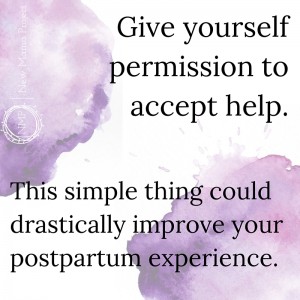Imagine that you lived generations ago, when families lived more communally than we do today. Or in another culture that still lives communally today. Your baby is born and your mother, sister, and aunt are there with you for weeks, months, or even longer afterwards. In those early days, they take care of the cooking, cleaning, and caring for other children. You have been around when they breastfed their babies and you have a blueprint for doing the same thing with yours. You don’t have to explicitly ask for help, and it isn’t explicitly offered, but it is freely given, as it is the norm at the time. A year later, your sister has a baby and you, your mother, and your aunt do the same for her. This cycle continues throughout your childbearing years.
 Can you fully imagine what that might have been like for you? Would you have experienced an easier transition, knowing that the adjustment was normal and having more time to focus on resting, healing, and nourishing yourself and your baby? It’s almost hard for me to wrap my brain around this because we exist in a completely different paradigm these days. But I’ve been thinking about how we can take some ideas from this past way of life and apply them to postpartum life today. And the major idea I keep coming back to is quite simple: give yourself permission to accept help. I believe this simple thing could change so many mothers’ postpartum experiences for the better.
Can you fully imagine what that might have been like for you? Would you have experienced an easier transition, knowing that the adjustment was normal and having more time to focus on resting, healing, and nourishing yourself and your baby? It’s almost hard for me to wrap my brain around this because we exist in a completely different paradigm these days. But I’ve been thinking about how we can take some ideas from this past way of life and apply them to postpartum life today. And the major idea I keep coming back to is quite simple: give yourself permission to accept help. I believe this simple thing could change so many mothers’ postpartum experiences for the better.
I’ve always been, and still am, somebody who likes to feel capable and independent. From the time I could speak, I was repeating the sentence, “Tee do by self” when offered help (my family’s nickname for me is “Tee”). It’s no surprise that my world was rocked after my son’s birth because I simply could not do it all by myself. After he was born, my mom stayed with us for a couple of weeks. She made me breakfast every day (I can still smell that delicious strawberry/blueberry bread) and made sure I was well fed. She helped me set up a more convenient changing station for the baby so I didn’t have to go upstairs after my cesarean. She did laundry, kept the dishes clean, and kept the house in order for us. She was only scheduled to stay for a week, but the night before she was supposed to leave I broke down in tears and asked if she could stay a few more days. Asking her to do this was a huge struggle for me. Not because I was afraid she would say no, but because I felt like my husband and I should be able to handle it by ourselves. The truth is, no new parents can really and truly handle their life with a newborn, and all the responsibilities that come along with it, right away. Before I found the courage to ask her to stay longer, these questions ran through my mind:
 Am I admitting weakness by asking her to stay?
Am I admitting weakness by asking her to stay?
Am I a bad mother because I want her to stay?
If she stays, how will I ever figure it out on my own?
Will she be inconvenienced by staying longer?
Why am I having such a hard time with all of this?
Thank goodness I shared these concerns with my husband and he encouraged me that it was OK and good to ask her to stay. (I think he wanted the support too!). She stayed, and I was so grateful that I was able to continue to rest and heal. I still experienced a challenging postpartum transition, but I imagine that it would have been even harder had I not had the support I did from my mom.
So, what can you do to create an environment of loving support for yourself in a time when we’re conditioned to be independent, capable, and solitary? Here are a few ideas:
Accept help. Really. If you really pay attention, you might be surprised at how many people offer to help you. Instead of brushing it off, or worrying that you’re inconveniencing somebody, just say yes. Allow them to help you. If this is hard, remind yourself that you’re often happy to help others and it feels good to be taken up on an offer to help.
Be specific about the type of help you need. If somebody offers general help, let them know what will be most helpful for you. Do you want somebody to talk to about your fears and anxieties? Do you need somebody to go grocery shopping and prep some healthy meals for your family? Do you need somebody to hang out with your older kids for an afternoon? Don’t be afraid to be specific. Your helpers will be grateful for this little bit of direction.
Ask for help. This is taking it one step further. If you need something that you’re not getting, identify the right person to ask and then ask them. It might not be your mom like it was for me. And that’s OK. Call a friend, sister, or doula and get yourself some community support.
Remind yourself it’s best for your baby. Accepting and asking for help because it’s good for us is absolutely a great enough reason to do it. But if you’re having trouble believing that, remember that it’s best for your baby if you’re nurtured, calm, and relaxed. An anxious and frantic mother is less able to connect calmly with her baby. These precious weeks will go by fast and you and your baby will truly benefit from your ability to accept some help.
Today I encourage you to think about one thing you need right now. It can be small, like asking your partner to bring your morning coffee or tea to you in bed each day while you nurse the baby. Or it can be huge, like reaching out for some more support in your home, whether that’s asking a friend, relative, or doula to come be with you. Write down this one thing you need and commit to asking for it. Or reach back out to somebody who has offered to help and actually take them up on their offer. If we keep on working to rebuild this culture of communal support after our babies are born, I am hopeful that more new others will experience easier postpartum transitions. Let’s start today, with you.
